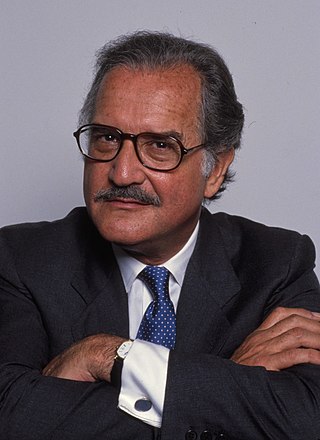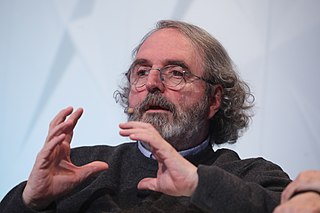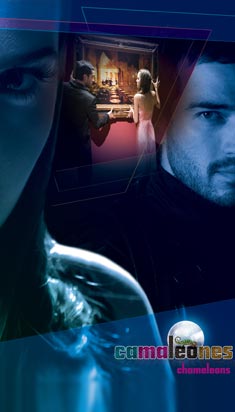
Gabriela Alejandra Guzmán Pinal is a Mexican pop and rock singer. With more than 30 million records sold throughout her career, winner of a Latin Grammy Award, and nicknamed "La Reina de Corazones" and "La Reina del Rock", she is one of the most successful Mexican female singers. She is also daughter of actress Silvia Pinal and singer Enrique Guzmán.

Juan Goytisolo Gay was a Spanish poet, essayist, and novelist. He lived in Marrakesh from 1997 until his death in 2017. He was considered Spain's greatest living writer at the beginning of the 21st century, yet he had lived abroad since the 1950s. On 24 November 2014 he was awarded the Cervantes Prize, the most prestigious literary award in the Spanish-speaking world.

Carlos Fuentes Macías was a Mexican novelist and essayist. Among his works are The Death of Artemio Cruz (1962), Aura (1962), Terra Nostra (1975), The Old Gringo (1985) and Christopher Unborn (1987). In his obituary, The New York Times described Fuentes as "one of the most admired writers in the Spanish-speaking world" and an important influence on the Latin American Boom, the "explosion of Latin American literature in the 1960s and '70s", while The Guardian called him "Mexico's most celebrated novelist". His many literary honors include the Miguel de Cervantes Prize as well as Mexico's highest award, the Belisario Domínguez Medal of Honor (1999). He was often named as a likely candidate for the Nobel Prize in Literature, though he never won.

Mexican literature stands as one of the most prolific and influential within Spanish-language literary traditions, alongside those of Spain and Argentina. This rich and diverse tradition spans centuries, encompassing a wide array of genres, themes, and voices that reflect the complexities of Mexican society and culture. From ancient indigenous myths to contemporary urban narratives, Mexican literature serves as a poignant reflection of the nation's essence, inviting readers to explore its rich history, diverse culture, and collective aspirations.

David Grossman is an Israeli author. His books have been translated into more than 30 languages.

Edith Marion Grossman was an American literary translator. Known for her work translating Latin American and Spanish literature to English, she translated the works of Nobel laureate Mario Vargas Llosa, Nobel laureate Gabriel García Márquez, Mayra Montero, Augusto Monterroso, Jaime Manrique, Julián Ríos, Álvaro Mutis, and Miguel de Cervantes. She was a recipient of the PEN/Ralph Manheim Medal for Translation and the 2022 Thornton Wilder Prize for Translation.

Hélène Elizabeth Louise Amélie Paula Dolores Poniatowska Amor, known professionally as Elena Poniatowska, is a French-born Mexican journalist and author, specializing in works on social and political issues focused on those considered disenfranchised, especially women and the poor. She was born in Paris to upper-class parents. Her mother's family fled Mexico during the Mexican Revolution. She left France for Mexico when she was ten to escape World War II. When she was 18, she began writing for the newspaper Excélsior, doing interviews and society columns. Despite the lack of opportunity for women from the 1950s to the 1970s, she wrote about social and political issues in newspapers and both fiction and nonfiction books. Her best-known work is La noche de Tlatelolco, about the repression of the 1968 student protests in Mexico City. Due to her left-wing views, she has been nicknamed "the Red Princess". She is considered "Mexico's grande dame of letters" and is still an active writer.

Ricardo Piglia was an Argentine author, critic, and scholar best known for introducing hard-boiled fiction to the Argentine public.

María Concepción Balboa Buika, known as Concha Buika or just Buika, is a Spanish singer. Her album Niña de Fuego was nominated for the 2008 Latin Grammy Award for Album of the Year and La Noche Más Larga was nominated for Best Latin Jazz Album at the 56th Annual Grammy Awards in 2014.

Jon Juaristi Linacero is a Spanish poet, essayist and translator in Spanish and Basque, as well as a self-confessed former ETA militant. He lives in Madrid.

Myriam Montemayor Cruz, better known mononymously as Myriam, is a Mexican recording artist known for winning the first season of Mexican talent show La Academia.

Camaleones (Chameleons) is a 2009 Mexican telenovela produced by Rosy Ocampo for Televisa. The telenovela aired on Canal de las Estrellas from July 27, 2009 to January 29, 2010. It stars Belinda, Alfonso Herrera, Edith González and Guillermo García Cantú.

Javier Álvarez Fuentes was a Mexican composer known for compositions that combined a variety of international musical styles and traditions, and that often utilized unusual instruments and new music technologies. Many of his works combine music technology with diverse instruments and influences from around the world. He taught internationally, in the UK and Sweden, and back in Mexico later in his career.
The Prix Formentor is an international literary award given between 1961 and 1967, and, after a long break, from 2011. In the 1960s, the Formentor Group offered two prizes, the Prix Formentor and the Prix International ; the former was given to previously unpublished works and the Prix International was given to works already in distribution.

Part of Me is a Spanish-language telenovela produced by United States and México-based television network Telemundo Studios, Miami. It is based on the 2005 Telemundo telenovela El Cuerpo del Deseo, which in turn is based on the 1992 RTI Colombia telenovela En Cuerpo Ajeno. María Elisa Camargo and David Chocarro stars as the main protagonists, while Vanessa Villela and Jorge Luis Pila stars as the main antagonists, with the special participation of Laura Flores.
Cambio de Piel may refer to:

Juan Diego Covarrubias is a Mexican actor.
The BBVA Foundation Frontiers of Knowledge Awards are an international award programme recognizing significant contributions in the areas of scientific research and cultural creation. The categories that make up the Frontiers of Knowledge Awards respond to the knowledge map of the present age. As well as the fundamental knowledge that is at their core, they address developments in information and communication technologies, and interactions between biology and medicine, ecology and conservation biology, climate change, economics, humanities and social sciences, and, finally, contemporary musical creation and performance. Specific categories are reserved for developing knowledge fields of critical relevance to confront central challenges of the 21st century, as in the case of the two environmental awards.
The Premio Biblioteca Breve is a literary award given annually by the publisher Seix Barral to an unpublished novel in the Spanish language. Its prize is €30,000 and publication of the winning work. It is delivered in February, to a work from the preceding year.

Piel a Piel is the second studio album by Spanish singer Marcos Llunas, released in 1994 by PolyGram Latino. The album was produced and mainly written by Spanish singer-songwriter Juan Carlos Calderón, and was promoted by its lead singles "Guapa", "Mañana" and "La de Siempre". The album sold 80,000 copies in Mexico in 1994
















